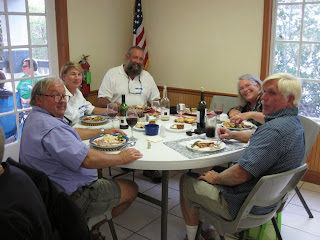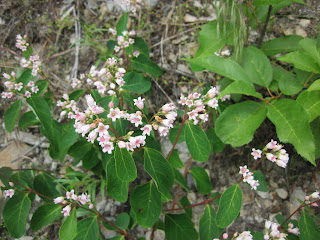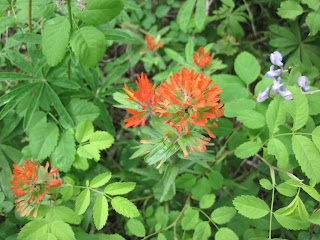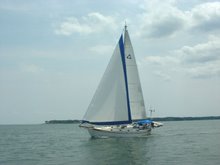Location:
near Mount Rushmore, South Dakota
Position:
N 43 56.122 W 103 24 043
After
3 weeks, 3890 miles, 6 states, 4 National parks, 21 nights of camping
and many scenic highways – we're heading back east.
It's
been a great trip, not exactly what we'd planned but awesome all the
same. Due to limited time to see our granddaughter, Tigerlily, and
the cold weather we decided to forgo Canada and instead spent some
quality time in the NW US exploring places we haven't been before.
We've
had an amazing time and Wanda has performed fantastically.
In our last khronicle we talked about being cold. We'd hoped that this would improve, but unfortunately it didn't. We worked our way up the spectacular California and Oregon coasts, we've never seen coastline quite like it. Huge rocks just sitting offshore, rivers flowing out to sea in competition with the incoming tides and currents cause enormous sand bars which the rivers wind through trying to make their way out into the ocean.

We
decided to head inland and spent the night near Crater Lake National
Park. With morning temperatures below 30 degrees F we got up early
and headed up to Crater Lake. Due to low clouds making it virtually
impossible to see the lake down inside the volcanic crater, high snow
banks and ice covered trees it didn't take us long to 'explore' the
park. We were cold and definitely underdressed. A stop at a thrift
shop in Bend, Oregon was in order where we purchased more warm
clothes, socks and an additional blanket. Being in the van at night
wasn't too bad but the evenings and mornings when we were cooking and
eating outside we just weren't having a lot of fun.
Good
friends who used to live in the Mt Hood/ Columbia River area of
Oregon had sent us a list of their favourite hikes, drives and stops.
We spent 6 warmer days happily exploring. What a magical place, we
see now why they love that area so much. The most spectacular hike
took us up through dense forest, suddenly bursting out onto a very
narrow path that skirted the slope of Bald mountain. Steep on both
sides, one up, the other down, abounding with wildflowers. We
rounded a bend and in front of us, so close we could almost touch it,
was Mount Hood, shrouded in snow. Breathtaking.

The
drive down from Mt Hood National Forest into the Columbia River Gorge
took us quickly from dense forest to a lush valley filled with
orchards and then we spilled out into the Columbia River. Our
friends had said we should stop at every waterfall along the river.
We're glad we did as they were all different. A lovely evening spent
in Portland visiting with our friends family, they were so welcoming
and we were treated to “Pacific Northwest fish and chips”
consisting of grilled Columbia River salmon with baked sweet potato
home fries – delicious!
Our
next stop was Mt. Saint Helens in Washington to see the devastation
and change caused by an eruption in 1980. The visitors centre looks
right into the cone of the volcano and has a great film depicting the
eruption and how the vegetation and wildlife have slowly recovered.
We spent the night in a dispersed camping area nearby. Luckily there
wasn't another eruption.
Next
we took another scenic route past Mt Ranier, then down out of the
mountains to the wheat filled high plains of east Washington state
and into Idaho. We drove up the Lochsa river for 100 miles winding
up through this amazing gorge, a favourite spot for white water
rafting and kayaking. It's amazing how much water is transported
down these rivers in the spring from the melting snow above. Over
the top of the Lolo pass, 10,000 feet elevation into Montana. We
certainly have a heart felt respect now for the pioneers who
travelled through these mountains on wagons.
Other
friends from Missoula, Montana had sent a list of places to visit
there. Julie especially loved the carousel.
After
stopping at 3 historic ranger stations and the fire jumpers museum we
feel like we've expanded our knowledge and appreciation of forest
fire fighters.
Next
it was south and east to Yellowstone National Park in Wyoming, the
weather was finally warming up and we were much happier. Yellowstone
was the first national park. Created in 1872 it covers 3,472 sq
miles. We spent 4 days exploring and didn't even start to see
everything. Of course we covered all the high spots Grand Canyon of
the Yellowstone, Yellowstone Lake, more “geothermal features”
geysers (geysers including Old Faithful and many hot springs,
mudpots, and sulphur springs) than you'd want to see in a lifetime.
But we also managed to get off the beaten path and enjoyed hiking and
wildlife spotting. The amazing part is that even though 3 million
people visit the park each year as soon as you get off the main roads
and the most popular tourist spots you can really be away from it all
and enjoy the park as it is meant to be.



We
left Yellowstone and spent another spectacular day driving over the
scenic Beartooth Pass back into Montana. The 70 miles of switchbacks
took us to an altitude of 11,000 ft, luckily the pass had just opened
up the week before. We made many stops to fully appreciate the
breathtaking and varied scenery.
Our
last stop was Mt Rushmore, South Dakota. Not what you would call a
natural beauty but we couldn't pass by without missing this American
shrine.
So
you can see we've driven a lot of miles, seen amazing and varied
scenery and lots of sights. The best part is that we've spent almost
95% of our time on scenic highways, passing through small towns,
stopping to see as many scenic views and points of interest, like the
Teapot Dome Gas Station in Zillah, Washington,
and the St. Ignatius
Mission, Montana.
We can't possibly tell you everything but we're
posting lots of pictures on the blog for you to enjoy.
The
varied scenery, the wildlife and the profuse spring wildflowers have
both taken our breath away and filled our hearts with joy.



























































